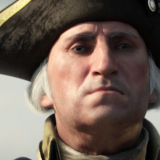I just finished Star Trek TNG
By EpicSteve 33 Comments
Star Trek is seemingly that thing everyone knew about but me. I would always hear references to characters and episodes and wouldn't be able to participate in the conversation. Even as an outsider I recognized Star Trek (mostly The Next Generation) is a zeitgeist. It's like The Simpsons in pretty much anyone on the street of a certain age can name you the entire main cast and probably list specific episodes as their favorites. Frankly speaking, I felt horribly out of touch. My dad is way into The Next Generation (TNG) and I would watch it in passing growing up, but to a six year old boy TNG is too dry.
I really enjoyed J.J. Abram's Star Trek and noticed immediately that this fictional universe is incredibly convincing. The idea of the most ideal capture of humanity's future was appealing to me. Star Trek has the rules that makes a consistent universe work. Finally on a February evening I took to plunge into TNG and now three months later I finished the 178 episode series along with all 4 movies. Overall outside of a painful first 2 seasons and Crusher banging a ghost, I fell in love with the series.
What Star Trek does best is the suspension of disbelief. It skips the bullshit of aliens would obviously speak another language, thus it would take decades for humans to actually establish meaningful contact. Everyone just speaks English! It allows to series to delve straight into the main elements of exploring new cultures and how those cultures interact with humans.
In no particular order here are my favorite episodes!
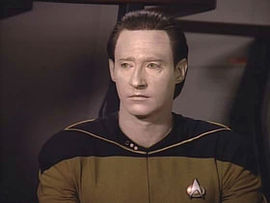
The Measure of a Man
Written by: Melinda Snodgradd
Directed by: Robert Scheerer
The terrible second season did have one redeeming episode that happened to not only be one of Data's (the android character) bests but also a weirdly accurate portrayal of dark American history. This is a perfect example that demonstrates why Star Trek works without giant space battles all the time.
Starfleet wants to disassemble Data to study in hopes of creating more androids. This procedure however has a high chance of killing Data. Captain Picard along with the android crew member opposes this.
A court case is set into motion to answer the question on whether or not Data is a person or Starfleet property. Tackling these moral dilemmas is why TNG is great. Riker (The Officer with the beard) has to play the unfortunate role of opposing Data as a sentient being. He tried to prove Data is just like any appliance to the court by easily removing Data's arm without harming him and in a bold move simply turns him off like any other machine.
Picard playing defense eventually wins the case demonstrating that Data has pride over Starfleet medals and has even been intimate with a human. He explains that if Data is considered property, he loses his basic rights. At that point, Starfleet would be slavers and eventually frowned upon by other civilizations and future generations. Data is not only the realization of his creator's dreams but is an entire new species and must be treated with the respect any other culture would receive. Starfleet's mission is to explore strange new worlds and discover new life. Picard pointed out Data is new life, he and any androids that may be created after him must be treated with dignity.
This parallels slavery in early America. There was a case in which a black slave in the South ran away and found himself in the free North. The slave was eventually captured by his master. There was a court case that was designed to figure out that if this black man was the property of the Slaver or could be considered a person so long as he was in the North. Unfortunately, this didn't end like Data's trial. The salve was considered property.
Dr. Marin Luther King also released a short book titled “A Measure of a Man” which illustrates his definition of political and social philosophy and non-violent activism.
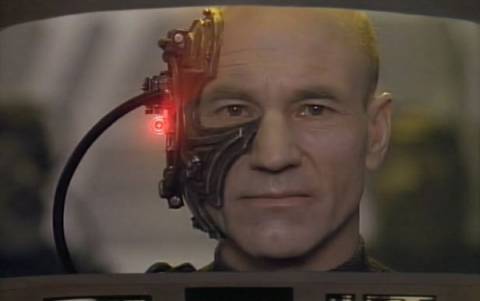
Best of Both Worlds
Written by: Michael Piller
Directed by: Cliff Bole
This 2 part episode is so insane it ended up at my local theater last month! “Best of Both Worlds” is known for being the most action oriented episode of Star Trek and for what is argued as the most intense cliffhanger in TV history.
As a polar opposite of “A Measure of a Man”, this is about the giant space battle. The Federation has to tackle their ultimate nemesis, The Borg head-on. Picard has been assimilated into The Borg, becoming the antagonist.
There are some great dynamics between an up-and-coming female officer seeking Riker's job as First Officer of the Enterprise. She eventually gets her position but only at the expense of Picard's capture and Riker moving up to captain. Riker then struggles to let go of Picard and make the ship his own.
The Enterprise eventually saves their part of the galaxy from being enslaved. Picard however, is haunted and will spend the next episode, “Family”, struggling to cope with the fact he's responsible for thousands of deaths.
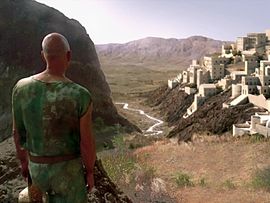
Inner Light
Written by: Morgan Gendel
Directed by: Peter Lauritson
In this episode, the Enterprise encounters an alien probe the knocks Picard unconscious. He wakes up on an unfamiliar planet, yet he is known in the community as Kamin and even has a wife. Picard immediately rejects this as an illusion but after years go by he embraces his wife and community. After he lives out an entire life , Picard reawakens on the Enterprise. It turns out he never left the ship and was only unconscious for 25 minutes. The probe turned out to be an artifact of an ancient civilization that preserved their culture for other beings to witness.
Picard is saddened. He lived an entire lifetime as another man and raised a family. Yet somehow he discovers the flute that he played for his wife and kids.
This is an amazing episode that went on to win the 1993 Hugo award for best dramatic presentation. It also did a fantastic job at showcasing Patrick Stewart's acting.
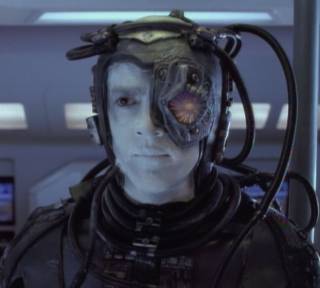
I, Borg
Written by: Rene Echevarria
Directed by: Robert Lederman
The Enterprise brings aboard an injured Borg, part of the race of enslaving cyborgs we talked about in Best of Both Worlds. Being in the anonymous race of collective consciousness this drone has the simple name of “Third of Five”. The Borg don't use first person and lack individuality. Instead of saying “I will destroy your race”, Third of Five would say, “We will destroy your race”.
Between Guinan and Picard being violently treated by the Borg in the past, there's an extreme prejudice aboard the Enterprise. Geordi La Forge (that guy with the visor) and Dr. Crusher (red headed female) are more open minded of helping this young boy despite the rest of the crew seeing “it” as a threat.
After some heartwarming interactions, Third of Five forms a relationship with Geordi. Some of the ship's crew starts identifying Third of Five as "he" instead of "it". The Borg drone eventually becomes “Hugh”, embracing the individuality of a real name and also starts speaking in first person.
Picard believes this to be a trick. He pretends to still be apart of the Borg and orders Hugh to assimilate (turn into Borg and enslave) the Enterprise crew. Hugh objects, even referring to himself as an individual. At that point Picard he must decide to take Hugh back to the Borg collective or to protect him and let his newly found individuality grow. Realizing the Borg would never stop hunting for him, Hugh opts to go back.
A moral dilemma arises. The crew realizes that Hugh's experiences will be downloaded into the Borg. Then the Borg will have a split second of experiencing individuality. Picard choses to do that instead of committing genocide with the proposed idea of infecting Hugh with a virus. The possibilities of the entire Borg seeing themselves as individuals, even for a short while, are endless.
The Enterprise understand the Borg are evil, but only as a collective. They understand sending Hugh back without a virus to infect the other Borg puts the galaxy at risk of genocide. However, Picard begins to see the Borg as a race of beings that if they had individuality they may choose to choose a different life path.
This episode was probably the most emotionally impactful for me. Not a lot of fiction really gets to me, but it was truly touching when Hugh refused to kill off the crew and found his individuality. Also has a lot of good messages about not making hasty judgements against people.
Other episodes I really loved opening every description with "The one where".
Frame of Mind: The one where Riker is in an insane asylum and is being told he isn't in Starfleet and is crazy.
Lower Decks: The one where the episode pays attention to lower ranking officers that aren't reoccurring characters and them struggling with career advancement.
All Good Things: The one where Picard is traveling between three different time periods. Must assure people he isn't crazy. It's the last episode. Also, Q.
Remember Me: The one where everyone on the Enterprise is disappearing, along with their memories besides Dr. Crusher. Has the best line ever, "There's nothing wrong with me, there's something wrong with the universe."
Family: The one where Picard goes home to France and spends time with his brother. Picard struggles to cope with murdering a bunch of people as a Borg.
